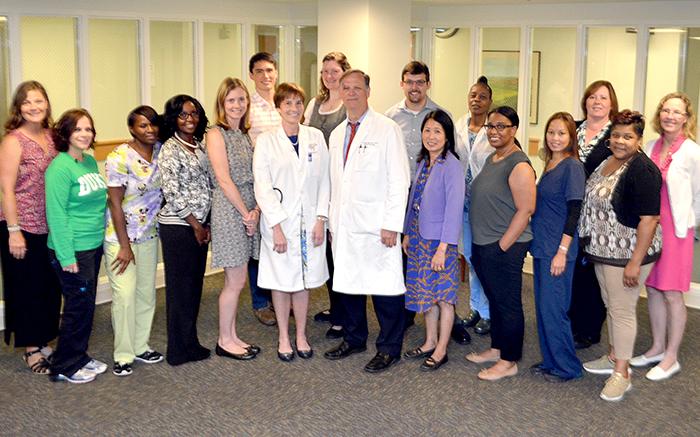
With a study watch on her wrist and a sleep sensor in her new tote bag, a Caucasian woman in her 40s walked out of the Duke University Medical Center around 5:30 p.m. Thursday, July 13 as the first participant enrolled in the Project Baseline study in Durham.
Simultaneously, Duke’s Project Baseline study team in Kannapolis, North Carolina enrolled their third participant. With another study visit in Kannapolis on July 14, Duke’s total enrollment has reached five participants since June 29. The process takes about a day and a half, and includes multiple health tests and donations of blood, urine, saliva, tears, and other biospecimens. Enrollment will continue ramping up this summer at both the Durham and Kannapolis locations, reaching full capacity this fall.

Members of the Duke team determine the participant’s ankle-brachial index, one of dozens of measurements taken during Project Baseline study enrollment. Photo credit: Duke Clinical and Translational Science Institute.
The study is the first initiative of Project Baseline, an ambitious effort to develop a well-defined “baseline” of human health, and a rich data platform to help researchers better understand health and disease and the transitions between them. Duke, Stanford Medicine, Verily and Google are collaborating on the study, which will enroll approximately 10,000 people and follow them for atleast four years.
Anyone who is at least 18 years old, a resident of the United States, able to speak and read English or Spanish, and not severely allergic to nickel or metal jewelry may register online at projectbaseline.com to enroll in the Project Baseline registry and be considered for the study.
Duke cardiologist L. Kristin Newby, MD, MHS, is the principal investigator for the Duke site. P. Kelly Marcom, MD, a Duke oncologist, is the co-principal investigator, and Paul T. Campbell, MD, a cardiologist in Concord, North Carolina, is the site investigator for the Kannapolis location.
To learn more, visit projectbaseline.com.